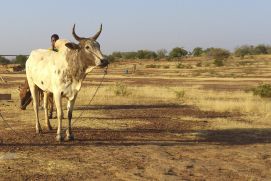WASCAL - German-African research alliances
Between 2021 and 2024, six collaborations on the respective climate research topics will be funded.
The GreenGaDe research project aims to provide baseline data on climate change mitigation and predict the evolution of greenhouse gas emissions and carbon stocks in agriculture in West Africa. A consortium of four West African and two German institutions with specialists in agriculture, forestry, modelling and greenhouse gas (GHG) monitoring will use a multidisciplinary approach to build a dataset at local and regional level. Stakeholders from research institutes and government institutions will work closely together to implement this project. The results of this project, such as climate maps, databases as well as capacity building, will support West African countries in developing and establishing Nationally Determined Contributions (NDCs) to reduce greenhouse gas emissions. Furthermore, climate change scenarios based on dynamics of the agricultural sector will be developed and provided. In this way, direct and indirect effects of climate and land use change on carbon storage and greenhouse gas emissions in West Africa will be better understood.
Duration: 01.04.2021 - 31.03.2024
The MiTra-WA project aims to better understand rural-urban migration and international migration, urban growth and the links between these phenomena and environmental change in West Africa. The project uses a translocal approach to livelihood and mobility analysis. This allows us to capture and analyse the complex migratory movements and cross-spatial interactions of individuals, households and communities typical of West Africa in the context of their livelihoods. Circular migration - i.e. shuttle migration between the region of origin and destination - is an integral part of the reality of life in West Africa. Many people organise their livelihoods in social networks that span large distances and often national borders. These "translocal interdependencies" have a significant impact on life in rural and urban areas - with profound social, economic and ecological effects. This project therefore focuses on empirical translocality analyses that provide a deeper understanding of translocal linkages and mobility for local livelihoods.
Duration: 01.04.2021 - 31.03.2024
The LANDSURF project makes a significant contribution to the WASCAL research programme by developing a West African Earth System Model (WESM) for high-resolution, longer-term climate change projections. The novel aspect of this regional climate modelling approach is the consideration of dynamic interactions between atmosphere and land surface processes, including human-induced land cover change and land degradation, and between atmosphere and ocean. In doing so, the LANDSURF project will pay special attention to the needs of end users and take them into account in the development of the regional climate modelling approach. Previous research has demonstrated the prominent role of land cover characteristics (for example, agricultural use of uncovered soils) and ocean influence on climate variability and predictions in sub-Saharan West Africa. The combination of an atmosphere-ocean model with an interactive vegetation model with the same high resolution is unprecedented. This will provide a new generation of more realistic climate change projections that will serve as a scientific basis for decision-making on better adaptation measures in West Africa, for example for national climate instruments such as the National Climate Contributions (NDC), the National Adaptation Plans (NAP) and other, local instruments.
Duration: 01.06.2021 - 31.05.2024
The MIGRAWARE project aims to provide a scientific and technical framework for assessing the processes, drivers and determinants of rural-urban and cross-border migration in West Africa. As a result of its research, the project will recommend management (governance) measures that are likely to reduce migration needs, improve local livelihoods and sustain human-environment interactions. The researchers in this project intend to study the typical migration pathways and histories that lead to migration from the poor hinterland to urban agglomerations and other places. This will enable governance instruments to be tailored to the local, national and intergovernmental (cross-border) levels.
Duration: 01.06.2021 - 31.05.2024
The FURIFLOOD project establishes a knowledge base on climatic drivers of current and future extreme flooding events in West Africa and combines it with case studies to gain a better understanding of future risks and consequences of such events. On this basis, the FURIFLOOD project derives environmental strategies to reduce current and future risks through a participatory process. The case studies of the FURIFLOOD project take place in the tropical regions of West Africa. They thus build on and complement the results of the first WASCAL research programme in the Sudanese savannah. This approach makes it possible to build up regional expertise on extreme flooding in West Africa and to maintain it in the WASCAL centre of excellence. KIT IMK-TRO will coordinate the project on the German side and work on the statistics and understanding of current and future extreme precipitation and its dynamics. The topics of the doctoral theses to be supervised here will cover other climate extremes such as heat waves, dust storms and droughts.
Duration: 01.08.2021 - 31.07.2024
West Africa has a very rapid population growth, which is accompanied by a strong intensification of agriculture. This leads, for example, to environmental damage, increased greenhouse gas emissions (TGE), soil erosion and loss of biodiversity. This situation is further exacerbated by climate change. Sustainable, resilient agriculture and food production is therefore crucial for improving local livelihoods. Sustainable agriculture must be resilient to climate change, reduce TGE and increase carbon sequestration in already degraded soils. The CONCERT project aims to identify emission reduction options for the main greenhouse gases carbon dioxide, methane and nitrous oxide in West African agriculture while improving food security. This will be achieved by (a) expanding WASCAL's river monitoring network, (b) estimating and forecasting the TGE budget using a fully coupled regional climate-hydrology-vegetation model tuned to the region, and (c) identifying land use options suitable for mitigating TGE, increasing soil carbon stocks and improving food security in the region.
Duration: 01.05.2021 - 30.04.2024
News about the measure
Last updated on






